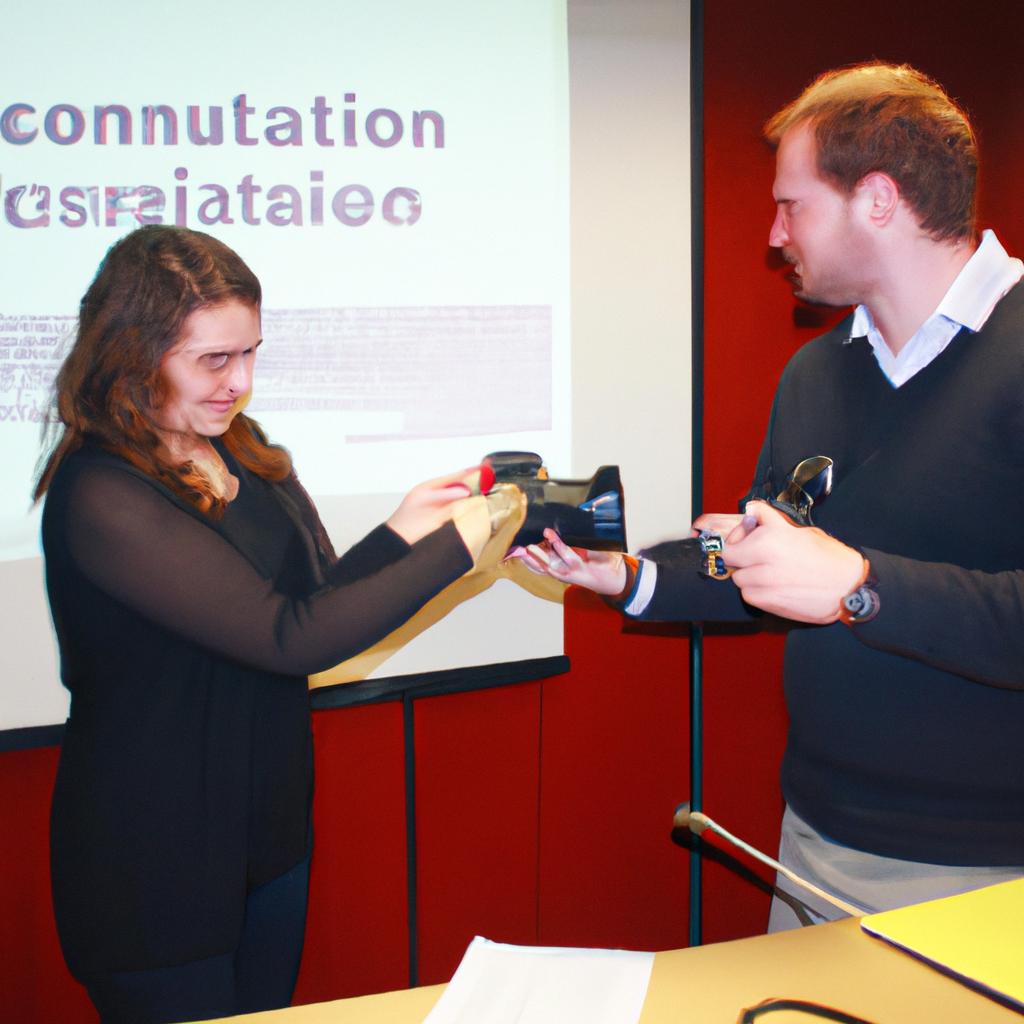Internships are an integral part of professional development in the broadcasting industry, providing invaluable hands-on experience and networking opportunities for aspiring radio professionals. In recent years, however, concerns have been raised about the financial burden that internships can impose on students and young professionals. This article explores the concept of broadcast financial aid specifically tailored to radio internships, aiming to alleviate some of the financial constraints faced by individuals seeking valuable work experience in this field.
To illustrate these challenges, consider the hypothetical case study of Sarah, a passionate undergraduate student majoring in journalism with a keen interest in radio broadcasting. Sarah dreams of securing an internship at a prominent local radio station but is deterred by the high cost associated with it. Like many aspiring interns, she faces numerous expenses such as transportation costs, housing arrangements if necessary, and other miscellaneous fees that may arise throughout her internship period. These financial burdens often limit access to internships solely to those who can afford them or rely on external support systems. Thus, exploring ways to provide broadcast financial aid becomes imperative in ensuring equal opportunities for all interested individuals regardless of their socio-economic backgrounds.
The following paragraphs will delve into various aspects related to radio internships and how implementing broadcast financial aid programs can level the playing field for aspiring professionals while also reducing the financial strain on students and young professionals.
One approach to providing broadcast financial aid is through scholarships or grants specifically designated for radio internships. These can be offered by universities, professional organizations, or even radio stations themselves. By earmarking funds for internships, these entities can support students like Sarah in pursuing their aspirations without worrying about the financial burden. Scholarships and grants can cover a range of expenses, including transportation costs, housing subsidies, and even stipends to help with daily living expenses during the internship period.
Another avenue for broadcast financial aid is partnerships between educational institutions and radio stations. Through these collaborations, universities can work with local radio stations to secure funding dedicated to supporting student internships. This could involve financial contributions from both parties or even in-kind services such as free studio space or access to equipment. Such partnerships not only provide financial assistance but also foster stronger ties between academia and industry.
Additionally, implementing a structured internship program that includes paid opportunities can alleviate some of the financial concerns associated with internships. While unpaid internships have been common practice in many industries, there has been a growing recognition of their inequity and exploitation potential. Offering fair compensation for interns’ time and effort ensures that individuals from diverse socio-economic backgrounds can participate without facing undue hardship.
Furthermore, mentorship programs within the broadcasting industry can play a vital role in providing guidance and support for aspiring radio professionals. Mentors who are already established in the field can offer valuable advice on navigating the internship process while sharing insights into managing finances during this period. Their experience and expertise can help interns like Sarah make informed decisions regarding budgeting, finding cost-effective alternatives for accommodation or transportation, and accessing additional resources available to them.
In conclusion, broadcast financial aid programs tailored to radio internships are crucial in promoting equal access to invaluable work experiences within the broadcasting industry. By offering scholarships or grants, fostering partnerships between educational institutions and radio stations, providing paid internships, and establishing mentorship programs, the financial burdens associated with pursuing radio internships can be alleviated. Ultimately, these initiatives will ensure that talented individuals like Sarah have an equal chance to thrive in the field of radio broadcasting.
Benefits of Radio Internships
One example of the benefits that radio internships offer is the opportunity to gain hands-on experience in a professional broadcasting environment. For instance, imagine an aspiring radio broadcaster named Sarah who secures an internship at a local radio station. During her time as an intern, she gets to work closely with experienced professionals, learning about different aspects of the industry such as programming, production, and on-air presentation. Through this practical experience, Sarah not only enhances her technical skills but also develops a deeper understanding of how a radio station operates.
Engaging in a radio internship can provide several valuable benefits for individuals looking to pursue a career in broadcasting:
- Networking opportunities: Interning at a radio station allows students or recent graduates interested in the field to build connections within the industry. These connections may lead to future job opportunities or mentorship from established professionals.
- Skill development: By working alongside seasoned broadcasters, interns have the chance to refine their communication skills, learn effective storytelling techniques, and practice using broadcast equipment and software.
- Exposure to different roles: Radio stations are multifaceted organizations requiring various skill sets. Interns often get exposed to multiple areas such as marketing, promotions, news reporting, or audio editing. This exposure enables them to explore different career paths within the industry.
- Resume enhancement: Having practical experience through an internship can make candidates stand out when applying for entry-level positions in the broadcasting field. It demonstrates dedication and initiative towards acquiring real-world knowledge.
| Benefit | Description |
|---|---|
| Networking Opportunities | Building connections with professionals already established in the radio industry |
| Skill Development | Enhancing communication skills; practicing storytelling techniques |
| Exposure to Different Roles | Exploring various areas like marketing, promotions, news reporting |
| Resume Enhancement | Demonstrating dedication and initiative towards acquiring real-world knowledge |
In conclusion, participating in a radio internship offers numerous advantages for individuals aspiring to work in the broadcasting sector. From gaining hands-on experience and expanding professional networks to developing essential skills and exploring different roles, internships serve as a stepping stone towards a successful career in radio. With these benefits in mind, it is crucial to understand the qualifications required to secure a position as a radio intern.
Moving forward, let’s explore the necessary qualifications for individuals seeking radio internships.
Qualifications for Radio Internships
Financial aid opportunities can greatly support and enhance the radio internship experience. For instance, imagine a student named Sarah who is passionate about pursuing a career in broadcasting but lacks the financial resources to fully commit to an unpaid internship. With the availability of broadcast financial aid programs, Sarah can alleviate some of her financial burdens while gaining valuable hands-on experience in the industry.
There are several ways in which radio internships can provide financial assistance to students like Sarah:
-
Stipends: Some radio stations offer stipends or allowances to their interns, providing them with a certain amount of money for their work during the duration of the internship. This monetary compensation helps cover living expenses such as transportation costs and meals, making it easier for individuals from diverse backgrounds to participate.
-
Scholarships: Certain organizations or foundations dedicated to promoting diversity and inclusion within the broadcasting industry may provide scholarships specifically for radio interns. These scholarships can help offset tuition fees or other educational expenses related to participating in an internship program.
-
Grants: Radio stations or affiliated organizations sometimes offer grants to financially support interns. These grants could be used towards housing accommodations, training materials, or professional development opportunities that further enrich the intern’s experience.
-
Loan Forgiveness Programs: In some cases, interns who demonstrate exceptional performance and commitment throughout their radio internships may have the opportunity to enter loan forgiveness programs offered by particular broadcasters or universities. Such programs allow participants to repay a portion or all of their student loans through working at designated stations after completing their internships.
To illustrate how these financial aid options work in practice, consider the following table showcasing different types of broadcast financial aid available for radio interns:
| Financial Aid Option | Description |
|---|---|
| Stipends | Monetary compensation provided directly by radio stations during the internship period |
| Scholarships | Educational funds awarded based on merit or need specifically tailored for aspiring broadcasters |
| Grants | Funding allocated by broadcasting organizations to assist interns with various expenses related to the internship |
| Loan Forgiveness Programs | Opportunities for interns to have a portion or all of their student loans forgiven through post-internship employment at designated stations |
By offering financial aid opportunities, radio internships become more accessible and inclusive. These forms of support not only alleviate financial burdens but also enable individuals from diverse backgrounds to pursue their passion for broadcasting without compromising their economic circumstances.
Transitioning into the next section about “Finding Radio Internship Opportunities,” it is important to explore how aspiring broadcasters can actively seek out these valuable experiences.
Finding Radio Internship Opportunities
Transitioning from the previous section on qualifications, let us now delve into the financial aid opportunities available to individuals pursuing radio internships. While these positions provide invaluable hands-on experience and networking opportunities, many aspiring interns face financial constraints that may hinder their ability to participate. However, there are various forms of financial assistance specifically designed to support those interested in radio internships.
To illustrate this point, consider the case of Sarah, a talented student passionate about pursuing a career in radio broadcasting. Despite her immense enthusiasm and skillset, Sarah faced significant challenges due to limited financial resources. Fortunately, she discovered several avenues through which she could obtain financial aid tailored to her needs as an aspiring radio intern.
Here are some examples of financial aid options commonly available for radio internships:
- Scholarships: Many organizations offer scholarships dedicated to supporting students pursuing careers in media or communications. These scholarships can cover tuition fees, living expenses, or both.
- Grants: Certain foundations and institutions provide grants specifically aimed at assisting individuals participating in unpaid or low-paying internships. These grants can help offset daily costs such as transportation and meals.
- Work-Study Programs: Some universities and colleges collaborate with local radio stations or media outlets to create work-study opportunities for students seeking practical experience. Through these programs, participants can earn income while gaining valuable industry knowledge.
- Sponsorship Opportunities: Companies within the broadcast industry often sponsor promising candidates by providing financial support during their internship period. This form of sponsorship not only helps alleviate financial burdens but also creates potential employment pathways after graduation.
Table: Financial Aid Options for Radio Internships
| Financial Aid Option | Description |
|---|---|
| Scholarships | Merit-based funds awarded to assist students covering educational expenses related to their internship program. |
| Grants | Monetary awards provided by organizations aiming to reduce the financial burden associated with unpaid or low-paying internships. |
| Work-Study Programs | Collaborative initiatives between educational institutions and media outlets that allow students to earn income while gaining practical experience. |
| Sponsorship Opportunities | Financial support provided by companies within the broadcast industry, often leading to potential employment opportunities after graduation. |
In light of these financial aid options, individuals like Sarah can pursue their passion for radio broadcasting without being hindered by economic constraints. By taking advantage of scholarships, grants, work-study programs, or sponsorship opportunities, aspiring interns can concentrate on honing their skills and building a strong foundation for future success.
Transitioning into the subsequent section about the application process for radio internships, it is crucial to understand how to navigate this competitive field effectively. Understanding the requirements and steps involved in applying will help candidates present themselves as strong contenders.
Application Process for Radio Internships
Transitioning from the previous section on finding radio internship opportunities, let us now explore the aspect of financial aid available for those aspiring to pursue internships in the field. To provide a clearer understanding, consider the following hypothetical case study:
Imagine Sarah, an ambitious student with a passion for radio broadcasting. She has secured an exciting internship opportunity at her local radio station but is concerned about how she will fund her living expenses during this unpaid experience.
Financial constraints should not deter individuals like Sarah from pursuing valuable internships that can significantly impact their career development. Many organizations recognize the importance of supporting interns financially and offer various forms of aid to alleviate the burden. Here are some options worth exploring:
- Scholarships and Grants: Several foundations and associations offer scholarships or grants specifically designed to support students undertaking media-related internships. These financial resources can cover living costs, transportation expenses, or even program fees.
- Internship Stipends: Some companies may provide stipends or allowances to help offset a portion of interns’ expenses while they gain practical experience within their organization.
- Work-Study Programs: Certain educational institutions allow students to participate in work-study programs where they can secure paid positions related to their field of study, including internships in radio broadcasting.
- Crowdfunding Platforms: With the rise of crowdfunding platforms, individuals have found success in raising funds for their internships by sharing their goals and aspirations with friends, family members, and supporters who believe in their potential.
| Funding Option | Description |
|---|---|
| Scholarships | Financial assistance provided through merit-based awards or competitive application processes run by foundations or associations |
| Internship | Monetary compensation offered by host companies as a means of supporting interns’ daily living expenses |
| Stipends | Regular payments made to interns by organizations, covering a portion of their costs during the internship period |
| Crowdfunding | Online platforms that allow individuals to raise funds for specific projects or experiences through sharing their story and soliciting support from friends, family, and other potential donors |
In conclusion, financial aid opportunities exist for aspiring radio interns like Sarah. By exploring scholarships, grants, stipends, work-study programs, and crowdfunding platforms, individuals can alleviate some of the financial burdens associated with pursuing valuable hands-on experience in the field. Now let us delve into gaining practical experience in radio broadcasting without further delay.
Gaining Experience in Radio Broadcasting
Transitioning smoothly from the previous section’s discussion on the application process for radio internships, let us now delve into another crucial aspect – financial aid opportunities available to aspiring broadcasters. To illustrate this further, consider the hypothetical case of Sarah, a passionate student pursuing a career in radio broadcasting.
Sarah dreams of interning at her local radio station but worries about the financial burden it may pose. Fortunately, there are various avenues that can provide assistance and support to individuals like Sarah who wish to pursue their passion without being hindered by financial constraints.
Firstly, several organizations offer scholarships specifically tailored towards students interested in radio broadcasting internships. These scholarships aim to alleviate some of the financial burdens associated with these positions. For example:
- The Radio Television Digital News Association (RTDNA) provides annual scholarship opportunities for journalism and communication students pursuing careers in electronic journalism.
- The Broadcast Education Association (BEA) also offers scholarships and grants aimed at supporting students studying media-related fields such as radio broadcasting.
In addition to scholarships, many radio stations themselves provide financial aid options through internship programs. These programs often offer stipends or other forms of monetary compensation to interns during their time with the station. Not only does this help cover expenses, but it also acknowledges the value interns bring to the organization.
Financial aid options available for radio internships:
- Scholarships dedicated to aspiring broadcasters
- Stipends provided by internship programs
- Grants offered by professional associations
- Sponsorship opportunities from industry partners
Furthermore, we can showcase information using a table format:
| Financial Aid Options | Description |
|---|---|
| Scholarships | Dedicated funding sources specifically designed for aspiring broadcasters. |
| Stipends | Monetary compensation provided by radio stations during internships to cover living expenses. |
| Grants | Financial support awarded by professional associations within the broadcasting industry. |
| Sponsorship | Opportunities for financial backing from industry partners supporting aspiring interns. |
In conclusion, while pursuing a radio internship may seem financially daunting at first, it is crucial to explore the various opportunities available for financial aid. Scholarships, stipends, grants, and sponsorships can significantly alleviate the burden of costs associated with these positions, allowing talented individuals like Sarah to pursue their dreams in radio broadcasting.
Transitioning seamlessly into the subsequent section on networking and career opportunities in radio, let us now turn our attention towards discovering how internships can open doors to exciting prospects within this dynamic field
Networking and Career Opportunities in Radio
Building on the importance of gaining experience in radio broadcasting, it is essential for aspiring professionals to explore opportunities such as internships. These hands-on learning experiences not only provide valuable knowledge and skills but also serve as a stepping stone towards a successful career in this dynamic industry.
Internships offer an avenue for individuals to immerse themselves in the world of radio broadcasting and gain practical insights into various aspects of the field. For instance, let’s consider the case of Sarah, a student pursuing her bachelor’s degree in communication. As part of her studies, she secured an internship at a local radio station where she had the opportunity to work closely with seasoned professionals. Through this experience, Sarah was able to learn about different roles within radio production, including scriptwriting, recording techniques, and audio editing.
To highlight further why internships are crucial for aspiring broadcasters, here are some key benefits:
- Practical Skills Development: Internships enable individuals to apply theoretical knowledge gained through academic programs to real-world scenarios. By actively participating in tasks related to programming, editing, or even hosting shows, interns can hone their technical abilities and gain confidence.
- Networking Opportunities: During internships, individuals have the chance to network with industry professionals who can provide guidance and potential job prospects. Establishing connections within the radio broadcasting community opens doors for future collaborations and mentorship.
- Industry Insight: Engaging directly with professionals exposes interns to current trends and challenges faced by those working in radio broadcasting. This firsthand exposure allows them to better understand the intricacies of the field and adapt accordingly.
- Resume Enhancement: Having relevant internship experience listed on one’s resume demonstrates commitment and dedication towards pursuing a career in radio broadcasting. It distinguishes candidates from others during job applications and increases their chances of securing employment.
Table Example:
| Benefit | Description |
|---|---|
| Practical Skills Development | Gain hands-on experience and refine technical abilities through active participation in various radio tasks. |
| Networking Opportunities | Establish connections with industry professionals for potential mentorship, guidance, and job prospects. |
| Industry Insight | Acquire a deeper understanding of current trends and challenges within the field of radio broadcasting. |
| Resume Enhancement | Stand out during job applications by showcasing relevant internship experiences and commitment to the industry. |
In conclusion, internships provide aspiring radio broadcasters with invaluable opportunities to gain practical skills, establish valuable connections, acquire industry insights, and enhance their resumes. By actively participating in internships like Sarah did at a local radio station, individuals can effectively bridge the gap between academic learning and professional application. As the next section will explore networking and career opportunities in radio broadcasting, it is important to recognize that internships serve as an essential foundation for building a successful career in this dynamic field.
 K7BUC
K7BUC



